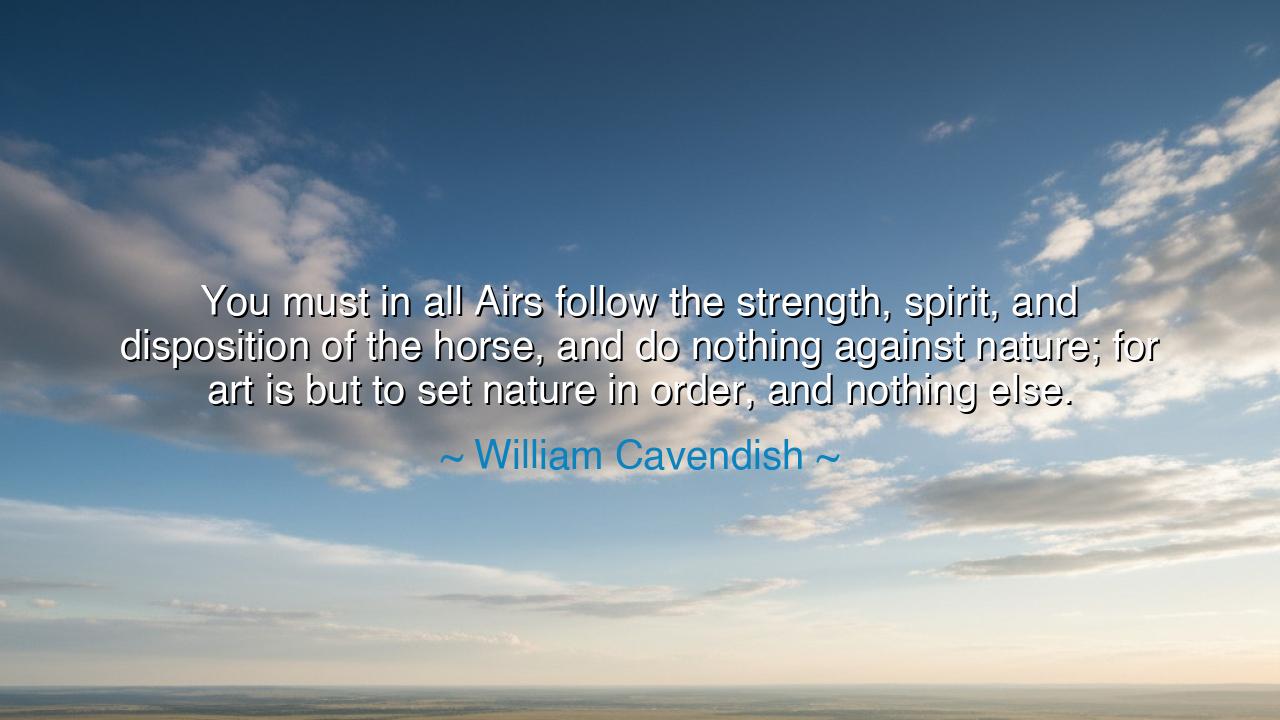
You must in all Airs follow the strength, spirit, and
You must in all Airs follow the strength, spirit, and disposition of the horse, and do nothing against nature; for art is but to set nature in order, and nothing else.






Hear the noble words of William Cavendish, Duke of Newcastle, master horseman and philosopher of the riding arts, who declared: “You must in all Airs follow the strength, spirit, and disposition of the horse, and do nothing against nature; for art is but to set nature in order, and nothing else.” This saying, though born from the art of horsemanship, reaches far beyond the stable and the training ground. It is a vision of harmony between man and the natural world, a reminder that true mastery does not lie in domination, but in alignment with what is already living and true.
Cavendish, famed in the seventeenth century as one of the greatest teachers of riding, understood the horse not as a machine to be forced, but as a living soul with spirit and disposition. To compel the creature against its nature was to invite rebellion, exhaustion, and ruin. But to follow its strength, to work with its will, was to release its nobility and grace. This was the essence of classical riding: not brutality, but partnership, where art refined and directed, yet never destroyed, the natural gifts of the animal.
The ancients knew this truth well. Xenophon, the Greek soldier and philosopher, wrote in his treatise On Horsemanship that one should treat a horse with gentleness, for harshness produces only fear, and fear kills spirit. He counseled that the rider’s task is not to crush the animal, but to shape its natural impulses into beauty and order. Cavendish, centuries later, echoed this wisdom: art cannot invent new essence—it can only set nature into proper balance.
Consider the story of Alexander the Great and his famed steed, Bucephalus. When others sought to tame the horse with whips and force, Alexander discerned the disposition of the beast. He noticed the animal feared its shadow, and so he turned its head toward the sun. In that act of understanding, not violence, the bond was formed. Bucephalus carried him into countless battles, not as a beast of burden but as a partner in glory. Alexander triumphed because he worked with nature, not against it.
The meaning of Cavendish’s words stretches beyond horses. In every art—whether painting, music, teaching, or leadership—the principle is the same. To fight against nature is to break what is whole; to follow it is to perfect it. The musician draws forth melodies already woven into harmony, the painter captures light as it already falls, the teacher guides the student’s natural spirit rather than crushing it. All true art is not invention from nothing, but alignment with the living order of the world.
The lesson is this: seek not to dominate life, but to understand it. In your work, your relationships, your learning, do not strive to bend everything to your will. Instead, discern the strength, spirit, and disposition of what is before you—whether person, task, or circumstance—and bring it into harmony. By working with nature, you achieve more than force ever could. For violence may command for a moment, but harmony commands for a lifetime.
What, then, are the practical actions? When you teach, study the spirit of your students and nurture it. When you lead, recognize the strengths of those you guide and place them where they may shine. When you create, do not fight the material, but let it reveal what it longs to become. And when you face your own soul, do not demand that it become other than what it is, but set it in order, refining your natural gifts into virtue and grace.
Thus Cavendish’s words endure: “Follow the strength, spirit, and disposition of the horse; for art is but to set nature in order, and nothing else.” Carry this wisdom, O seeker, and know that the highest mastery lies not in conquering life, but in walking beside it, guiding it gently into beauty, as rider with horse, as artist with brush, as man with the living world.






AAdministratorAdministrator
Welcome, honored guests. Please leave a comment, we will respond soon